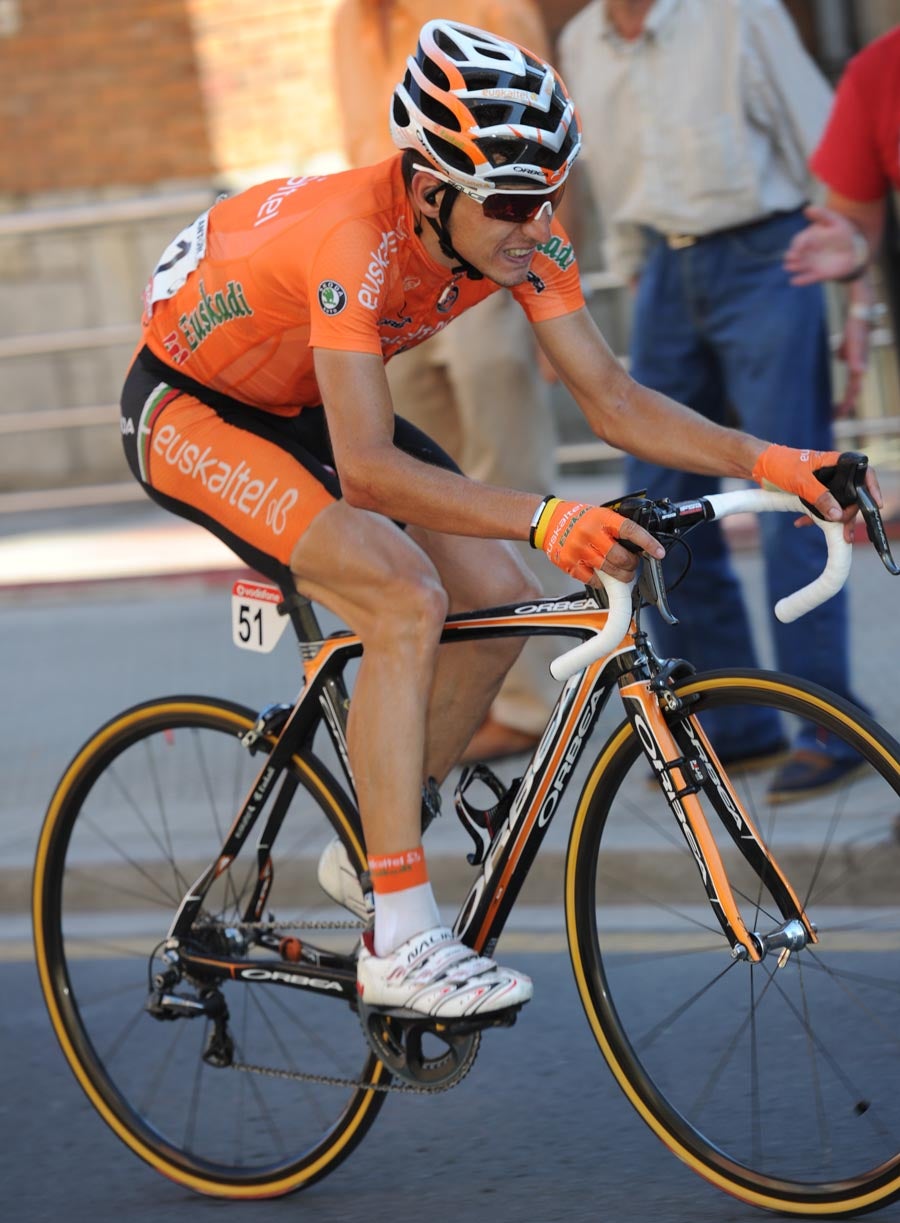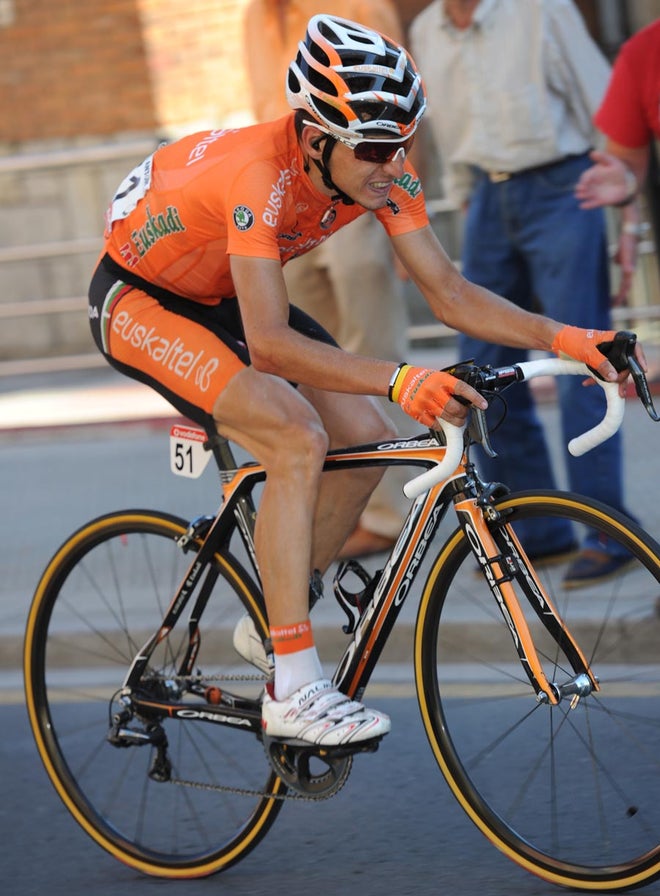Dream win for Antón as Vuelta returns to Basque Country

Antón's Giro d'Italia hopes suffered a serious blow Sunday. Photo: Graham Watson | <a id="www.grahamwatson.com" href="http://grahamwatson.com">www.grahamwatson.com</a>

BILBAO, Spain (VN) – Igor Antón delivered a dream-come-true victory in Friday’s emotional return to the Basque Country after a three-decade absence with an impressive solo victory.
Antón rode into the day’s winning breakaway and then dropped Marzio Bruseghin on the second passage over the 13-percent grades of the second-category Vivero climb to secure a huge win for his hometown team of Euskaltel-Euskadi.
“I could retire right now and I would be content,” Antón said after winning 41 seconds ahead of Bruseghin. “This is something that I will remember for the rest of my life. To win in front of your friends and family, in the Vuelta’s return to the Basque Country, well, it just gives me goosebumps to think about.”
The win was huge for Antón on several levels. First off, it erases his disappointment of not being up for the GC fight after starting as one of the pre-race favorites.
“After the Giro, I didn’t recover well. I got a small stomach bug and I wasn’t feeling good, then the alarm bells were going off,” Antón said. “In the first week of the Vuelta, it was very hard and I just wasn’t going well, so I had to give up on the GC and rethink my goals. After all the disappointment I’ve had in this Vuelta, to come back and win this stage in this setting makes up for everything.”
The victory is also massive for his Euskaltel-Euskadi team, one of the most unusual squads in the peloton where all the riders — minus Samuel Sánchez — are of Basque origin.
The team gains part of its annual budget from memberships sold to thousands of “socios,” who pay dues to back the popular squad.
“This is so moving for us as a team. I have never seen so many fans watching a stage in the history of the Vuelta,” said Euskaltel-Euskadi general manager Miguel Madariaga. “I knew that the fans would respond because they love the sport and they love peace as well.”
The return of the Vuelta to Spain’s Basque Country added another dimension to the already emotional scene.
Although the Basque Country is the hotbed of Spanish cycling, where most of the top Spanish riders race as amateurs, the Vuelta turned its back on the region when the race passed from Basque ownership to Madrid-based Unipublic in the 1970s.
Political unrest throughout the 1980s and 1990s centered on the Basque terrorist group ETA meant the race organizers were not keen on scheduling stages for fear of disruptions or even violence.
A vastly improved political climate and new attitudes within the Vuelta organization, however, saw the race return to the Basque Country this year.
“This is a very historic day for Basque cycling, and to have a Basque rider from a Basque team win the stage makes it even more significant,” said ex-pro Abraham Olano, who is the technical director of the Vuelta. “Being a Basque, it’s a very special moment for all of us. We hope that the Vuelta returns to the Basque Country and we will not have to wait another 33 years to do so.”
Fans poured out in record numbers to line the route, with large numbers on the Vivero climb as well as lining the finishing straight in Bilbao. Summer-like weather only fueled the party-like atmosphere throughout the stage.
When the route entered the Basque Country from nearby Cantabria, however, the peloton was welcomed by protestors holding signs demanding independence for the Basque Country. The stage unfolded without incident, but there was some worry that protestors might try to use the race as a platform for their political agenda.
“We saw the people with the flags and the armed guards, we thought, what’s going to happen here!” said Garmin-Cervélo’s Daniel Martin. “I love racing in the Basque Country. The climbs are perfect for me and it’s a really beautiful region.”
Antón’s dream victory was almost upended by Bruseghin. The veteran Italian was hanging close to the nimble Basque climber over the summit, but couldn’t erase a 30-second deficit on a downhill run to the finish line.
Bruseghin was quick to say that Antón deserved the victory.
“I don’t feel like I’ve lost the stage. When someone is stronger than you, you don’t lose. He’s the one who wins it, and the strongest today was Igor Antón,” Bruseghin said. “The arrival to Euskadi (Basque Country) was really emotional, a festival of cycling I will remember forever. I was pushing through the first climb on my own pace, and that was the reason I couldn’t win. In such a climb, it’s not important to stay on front or take the others’ wheel.”
The stage win also marks another milestone for Euskaltel-Euskadi, which won stages in all three grand tours this year. Mikel Nieve and Antón won stages in the Giro while Sánchez won a stage at the Tour de France.
For Antón, who grew up in the village at the base of the Vivero climb, winning with an attack over the climb made for a once-in-a-lifetime experience.
“I was trying to savor the moment,” Antón said. “I enjoyed it the first time up, but then I was really suffering on the second passage. It felt like the climb would never end, and the descent was even longer. I wanted to be in the breakaway today at any price, not only to have a chance to win the stage, but because the team wanted to be in the breakaway today as it returned to the Basque Country. Winning like this brings a very deep satisfaction.”